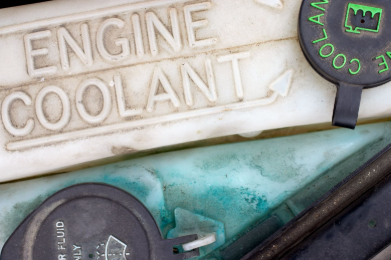Coolant Is Boiling: Here's Why and What to Do

Owning a car comes with its share of responsibilities, including understanding some of the issues you might face on the road. One such issue that can cause panic among car owners is discovering that their coolant is boiling. This blog post will guide you through why your coolant might be boiling and what steps you need to take to address this unsettling situation.
Understanding Coolant and Its Purpose
Coolant, also known as antifreeze, is a liquid that circulates through your car's engine to regulate temperature. It absorbs heat from the engine and dissipates it through the radiator. Without coolant, your engine would rapidly overheat, resulting in severe damage.
Coolant is a mix of water and typically ethylene glycol or propylene glycol. The mixture helps lower the freezing point and raise the boiling point of the fluid, ensuring it performs efficiently in extreme temperatures. This fluid is vital for maintaining the engine's optimal operating temperature, preventing it from overheating or freezing.
Regularly checking and maintaining your coolant levels is essential for your car’s health. Low coolant levels can lead to overheating, while contaminated or old coolant can lose its effectiveness, putting your engine at risk.
What's Causing Your Coolant to Boil?
Understanding the factors that contribute to coolant boiling can help you prevent or address this issue effectively. Here are the main reasons:
- Faulty Radiator Cap: The radiator cap maintains pressure in the cooling system, preventing coolant from boiling prematurely. A damaged or loose cap can allow pressure to escape, causing the coolant to boil at a lower temperature.
- Blown Head Gasket: A blown head gasket can allow combustion gasses to enter the cooling system. This can cause the coolant to overheat and boil, often resulting in a milky or foamy appearance.
- Faulty Thermostat: A stuck-closed thermostat prevents coolant from circulating properly, leading to overheating and boiling.
- Insufficient Coolant or Contamination: Low coolant levels or coolant contaminated with oil or other substances can lower its boiling point, causing it to boil more easily.
Regular maintenance and prompt attention to these factors can significantly reduce the risk of coolant boiling in your vehicle.
Signs Your Car’s Coolant Is Boiling
Recognizing the symptoms of boiling coolant is crucial for addressing the problem before it escalates. Watch out for these signs:
- Visible Bubbles in the Reservoir: This is the most obvious sign. If you see bubbles forming and rising in the coolant reservoir, it's a clear indication that the coolant is overheating and boiling.
- Overheating Engine: The engine temperature gauge will rise rapidly and may go into the red zone. This is a critical sign that the coolant is not effectively cooling the engine.
- White Smoke from Exhaust: When coolant is mixed with combustion gasses, it can create white smoke that exits the exhaust pipe.
- Sweet Smell: Overheated coolant has a distinct sweet odor. If you smell this coming from the engine compartment, there is a strong possibility that the coolant is boiling.
If you notice any of these signs, it's essential to stop the car immediately and let the engine cool down. Do not remove the radiator cap while the engine is hot, as this can cause severe burns. Bring your car into a local service center or request roadside assistance for further diagnosis and repairs.
Coolant Reservoir Boiling but Engine Doesn't Overheat
Sometimes, you might encounter a puzzling situation where the coolant in the reservoir is boiling, but the engine temperature remains stable. This can be due to:
- Faulty Radiator Cap: A defective cap may not hold sufficient pressure, causing coolant to boil in the reservoir while engine temperature remains normal.
- Air in the Cooling System: Air pockets can impede coolant circulation, creating localized hotspots that lead to reservoir boiling without affecting overall engine temperature.
- Inefficient Radiator Fan: A malfunctioning fan may not cool returning coolant adequately, causing overheating in the reservoir without impacting engine temperature.
- Incorrect Coolant Mixture: Using the wrong mixture or diluted coolant can lower its boiling point, making it more prone to boiling in the reservoir, especially in warm weather or during heavy loads.
Understanding these specific scenarios can help you address the issue more effectively. Always consult with a professional mechanic for a proper diagnosis!
The Dangers of Ignoring Boiling Coolant
Neglecting boiling coolant can lead to severe repercussions for your vehicle:
- Long-Term Engine Damage: Prolonged overheating can warp cylinder heads, crack engine blocks, and destroy gaskets, potentially requiring a complete engine replacement.
- Expensive Repairs: Fixing extensive heat damage can cost thousands of dollars, far exceeding the expense of routine maintenance and early intervention.
- Safety Concerns: An overheating engine can suddenly seize or cause steam to obscure your vision while driving, significantly increasing the risk of accidents.
- Diminished Vehicle Value: Chronic overheating issues can substantially reduce your car's resale value and reliability, impacting its long-term worth.
By addressing coolant issues promptly, you're not just maintaining your car's performance—you're safeguarding its longevity, ensuring your safety on the road, and protecting your investment. Don't let a small problem today become a costly nightmare tomorrow.
Let Christian Brothers Automotive Be Your Coolant Experts
While boiling coolant may seem like a daunting problem, understanding why it happens can help you take the necessary steps to prevent it. If you notice any signs of boiling coolant in your vehicle, don't hesitate to bring it to Christian Brothers Automotive.
Our expert technicians can diagnose and address any cooling system issues, ensuring your car runs smoothly and efficiently. We also offer regular specials on our services that can save you money while keeping your vehicle running at its best.
Don't delay in getting your coolant issues fixed – find your closest location today!

[1].jpg)
[2].jpg)
sunwash-tech-with-customer.png)
